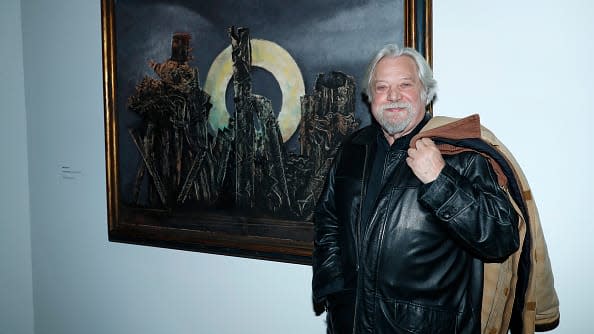Abu Ghraib Photo Exhibit Causes Outrage at Berlin Biennale
- Oops!Something went wrong.Please try again later.

In late July, artist Rijin Sahakian published an open letter in Artforum decrying the Berlin Biennale’s decision to exhibit Poison Soluble, an installation by artist Jean-Jacques Lebel (pictured above), in the latest Biennale exhibition.
Lebel’s maze-like setup, Sahakian writes, surrounds viewers with images of detainees being degraded—“the charred skin, limbs, and hooded faces of the Iraqi men abused and murdered at Abu Ghraib” prison in Iraq.
‘The Card Counter’ Asks Whether an Abu Ghraib Torturer Is Worthy of a Second Chance
In response to Sahakian’s letter, the Biennale issued an apologetic statement on Monday, Artnews reports.
Soluble Poison, a room-sized labyrinth installation by Jean-Jacques Lebel, is one of the most controversial pieces of the Berlin Biennial. The artwork is a giant blowup of photographs that American soldiers took while abusing Iraqi prisoners at the Abu Ghraib jail. #politics #art pic.twitter.com/vvtoSju19u
— Zarastro Art (@zarastro_art) August 6, 2022
“I see the white female soldier grinning over the arrangement of bodies piled together, and I am eye-level with a faceless person forced to hold his genitals,” Sahakian, who also funded an Iraqi art initiative called Sada, wrote of the installation in Artforum. “I see a corpse, the dead still waiting. Still waiting to give their permission the first time, the thousandth time, and this time is no exception. I’m forced to see them once again simply to view the second half of Abbas’s splintered work.” The Daily Beast reached out to Sahikian for comment.
In response to Sahakian’s letter, more than 340 people signed a letter in support of Iraqi artists, among them Sajjad Abbas, Raed Mutar and Layth Kareem, who requested that their art not be shown nearby the offending installation at the Biennale. Kareem’s 2014 video is called The City Limits and Mutar’s painting is called Untitled (2012).
Sahakian is referring to Abbas’ I Can See You, a 2013 photograph of the artist’s eye on the “Turkish Building” in Baghdad that faced the Green Zone, which served as the governmental center for the Coalition Provisional Authority during the American occupation of Iraq. The photo was also on display at the Biennale next to Lebel’s installation. The Daily Beast reached out to Abbas for comment via the Berlin Biennale.
The Biennale confirmed in their statement that the aforementioned artists works are now being shown at a different location at the Biennale, as is the photograph by Sajjad Abbas, whose work Sahakian also mentions in his letter.
“We apologize that the placement of the affected Iraqi artists’ works in close proximity to Jean-Jacques Lebel’s work caused them great pain,” the Biennial's statement reads in part. “We underestimated the sensitivity of the situation. We also apologize for failing to discuss the placement with them in advance in this special case.”
The Daily Beast reached out to the Berlin Biennale for comment and were directed towards the quoted statement.
Get the Daily Beast's biggest scoops and scandals delivered right to your inbox. Sign up now.
Stay informed and gain unlimited access to the Daily Beast's unmatched reporting. Subscribe now.
